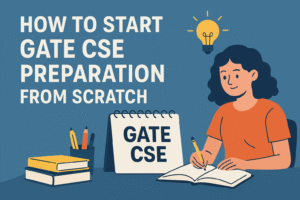Introduction
The Graduate Aptitude Test in Engineering (GATE) is one of India’s most prestigious examinations for postgraduate admissions and public sector jobs. Among its multiple streams, GATE Life Sciences (XL) caters to students from diverse biology and chemistry backgrounds. Whether you’re from B.Sc., M.Sc., B.Tech Biotechnology, or any Life Sciences discipline, GATE XL is your gateway to IITs, IISc, and top research institutions.
This blog provides a complete strategy guide for GATE Life Sciences 2026, covering the syllabus, exam pattern, subject-wise preparation tips, important books, and resources to help you maximize your score.
GATE Life Sciences 2026: Quick Overview
Feature Details
Exam Name GATE Life Sciences (XL)
Exam Mode Computer-Based Test (CBT)
Total Marks 100
Total Duration 3 Hours
Number of Papers 1 (General Aptitude + XL paper)
Paper Code XL
Sections GA (15 marks) + Chemistry (XL-P) (25 marks) + 2 Optional Sections (30 marks each)
GATE Life Sciences XL 2026 Syllabus
GATE XL has three mandatory components:
1. General Aptitude (GA) – 15 Marks
Common to all GATE papers, includes:
Verbal Ability
Quantitative Aptitude
Logical Reasoning
2. Chemistry (XL-P) – 25 Marks
This is compulsory for all Life Sciences aspirants and covers:
Atomic Structure
Chemical Bonding
Thermodynamics
Reaction Mechanisms
Biomolecules
Enzymes
3. Optional Sections (Any Two) – 30 Marks Each
Choose 2 out of 5 sections:
XL-Q – Biochemistry
XL-R – Botany
XL-S – Microbiology
XL-T – Zoology
XL-U – Food Technology
Choose your optional subjects based on your academic background and comfort level.
GATE Life Sciences 2026 Preparation Strategy
1. Understand the Exam Pattern
Total Questions: 65 (10 GA + 55 Subject-specific)
Type of Questions: MCQs, MSQs, and NATs
Negative Marking:
1/3rd for 1-mark questions
2/3rd for 2-mark questions (only for MCQs)
Knowing the pattern helps in avoiding silly mistakes and managing time effectively.
2. Make a Subject-Wise Preparation Plan
A. Chemistry (XL-P)
Focus on Physical and Organic Chemistry.
Practice numerical questions on thermodynamics, equilibrium, and reaction kinetics.
Reference: Morrison & Boyd, O.P. Tandon, Atkins Physical Chemistry.
B. Biochemistry (XL-Q)
Key topics: Metabolism, Enzymes, Biomolecules, Protein structure.
Practice pathway-based questions like Glycolysis, TCA cycle.
Reference: Lehninger’s Principles of Biochemistry, Voet & Voet.
C. Botany (XL-R)
Topics: Plant physiology, Reproduction, Photosynthesis, Plant hormones.
Diagrams and concepts are essential.
Reference: NCERT Biology (XI & XII), Taiz & Zeiger.
D. Microbiology (XL-S)
Cover Microbial genetics, Immunology, Industrial microbiology, Pathogens.
Study standard lab techniques and media.
Reference: Prescott’s Microbiology, Pelczar & Chan.
E. Zoology (XL-T)
Focus: Animal physiology, Neurobiology, Reproduction, Endocrine system.
Comparative anatomy is frequently asked.
Reference: Guyton & Hall, NCERT Biology.
F. Food Technology (XL-U)
Emerging but scoring section.
Topics: Food processing, Preservation, Microbiology, Nutrition.
Reference: Fellows Food Processing Technology, FSSAI Guidelines.
3. Time Management Strategy
Preparation Phase Duration Focus
Foundation Phase Jul–Oct 2025 Cover syllabus basics, theory + notes
Revision Phase I Nov–Dec 2025 Start solving PYQs + revise notes
Mock Test Phase Jan–Feb 2026 Full-length tests + error analysis
Final Touch-up Feb 2026 Rapid revision + formulas + GA
Tip: Allocate 3–4 hours/day initially, then scale up to 6–8 hours/day closer to the exam.
How to Prepare General Aptitude (GA)
Even though GA is only 15 marks, it can greatly boost your rank with minimal effort.
Topics to Focus:
Time & Work
Percentages
Ratio & Proportion
English Grammar & Sentence Completion
Logical Reasoning
Resources:
RS Aggarwal’s Quantitative Aptitude
Indiabix or GradeUp quizzes
Previous year GATE GA sections
Last Month Strategy
1. Take a Mock Test Every 3 Days
2. Revise Formula Sheets & Flashcards
3. Revise Previous Year Questions
4. Strengthen Stronger Areas – Avoid new topics
5. Practice NATs (Numerical Answer Type) thoroughly
Common Mistakes to Avoid
Ignoring Chemistry (XL-P)
Choosing optional subjects based on peer pressure
Skipping General Aptitude
Not analyzing mock test errors
Rote learning without concept clarity
Benefits of Cracking GATE Life Sciences
M.Tech./Ph.D. Admissions: IITs, IISc, NITs, IISERs, etc.
PSU Recruitment: BARC, DRDO, ICMR (occasionally recruit via GATE)
Stipend: ₹12,400/month for GATE-qualified postgraduates
Research & Fellowship Opportunities: CSIR, DBT, SERB fellowships
Overseas Opportunities: Germany, Singapore, and European universities accept GATE score
How GATE IIT Helps in GATE Life Sciences Preparation
GATE IIT Coaching Institute is one of India’s leading institutes for GATE Life Sciences coaching. Here’s how they help aspirants:
Key Features:
Expert Faculty from IITs & IISc
Structured Online & Offline Courses
Test Series & PYQ Practice Sets
Personal Mentorship & Doubt Clearing Sessions
GATE XL Subject-Wise Coaching (Biochemistry, Botany, etc.)



